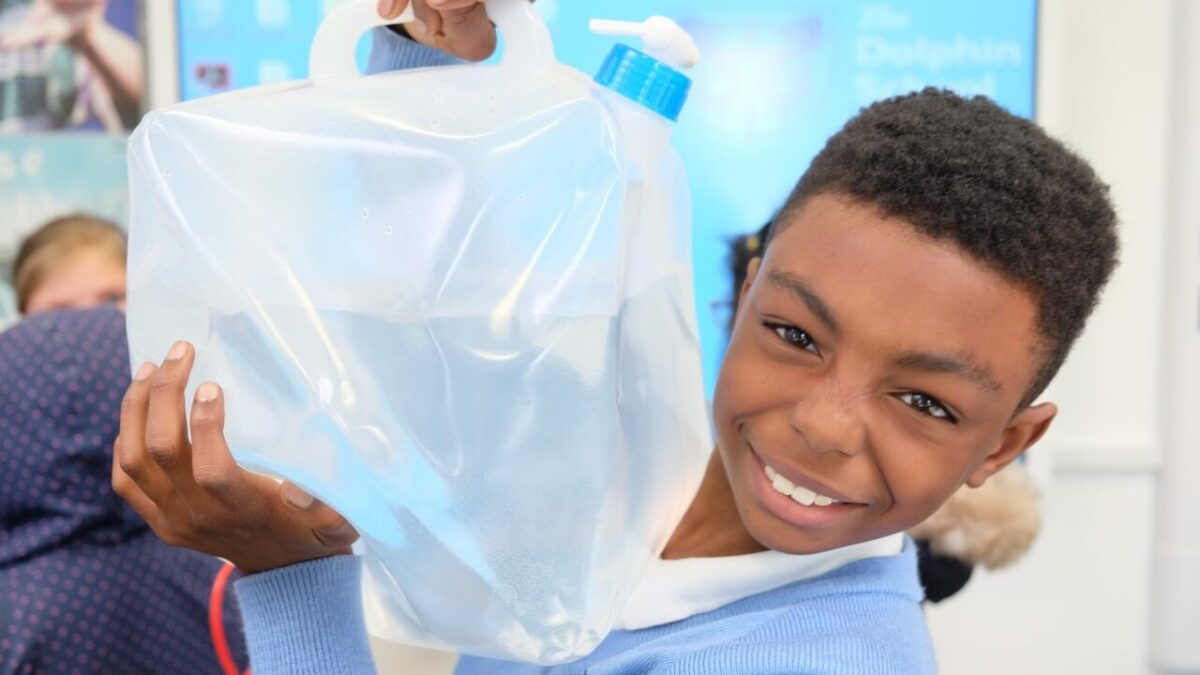How can you teach your children not to waste water?
26.09.24
By subscribing to our newsletter, you give us permission to email you with news of our work and events, plus opportunities for volunteering, challenges to take part in and special offers in our shop. You can unsubscribe any time by clicking the link in our email footer.

26.09.24

Water is one of our most precious resources, but many of us take it for granted, particularly if we didn’t learn water-saving habits growing up. As environmental concerns continue to grow and global water scarcity becomes an ever more pressing issue, teaching children the importance of conserving water has never been more crucial. But how can you best educate your children in a way that is age-appropriate, fun and educational? In this blog post, we will explore a few approaches you can take to instill a sense of responsibility in your children and promote more planet-friendly water usage habits.
Educate using age-appropriate language
So long as you use age-appropriate words, you can talk to your children about water scarcity issues in a way that feels comfortable to them and that they’ll understand. For example, you may want to talk about how crucial water is to all living things on our planet, and explain that for this reason, it’s important to cherish our supply.
Older children and teens may benefit from a more in-depth understanding of water scarcity issues, so long as you feel it’s appropriate. You could demonstrate your point with the help of useful facts and figures – for example, sharing that turning the tap off whilst brushing their teeth could save six litres of water a minute. By framing the information positively, you can help your children understand this serious issue in a way that feels more inspiring and hopeful.
If you’re not sure where to begin or feel you could benefit from some additional support, it may be worth reaching out to your children’s schools for advice on how best to talk about these issues. Their teachers may already be covering the topic in class – collaborating to adopt a similar communication style should help to drive the message home and reduce misunderstandings.
Plan enjoyable water-saving activities
There are lots of ways you can make saving water fun. In fact, completing your everyday household activities and chores alongside your children is a simple way to both teach them valuable lessons and keep them entertained on quieter days.
Most children will enjoy helping to mulch the garden, or collecting rainwater to water plants. Younger children in particular may enjoy sweeping any patio areas, saving you from using water to clean outdoor areas. Your children could also assist you in choosing some drought-resistant plants for your garden – both shopping for them and planting them can make for enjoyable, educational activities.
Similarly, cooking tasty plant-based meals together can be a fun challenge that the whole family will enjoy – meat production carries a much higher water footprint than vegetable production, so cutting down on your consumption of animal products is likely to have a far-reaching impact.
Lead by example
Children will often copy the behaviors of their caregivers, so doing your bit to reduce your water waste will go a long way in demonstrating healthier water consumption habits to your children. Commit to using water-saving techniques throughout the home wherever you can –
for example, you could reuse your cooking water, use a dishwasher instead of handwashing dishes, and make sure to only run your washing machine and dishwasher when they’re completely full.
Start making these changes as early as possible, so conserving water becomes the norm in your household while your children are growing up. You may also want to educate friends and family members on the importance and benefits of saving water, so the message stays
consistent no matter if your children are at home or in the company of friends.
A healthier way of living for future generations
By making water conservation a familiar concept at home, parents and guardians can encourage their children to make more planet-friendly choices. Just remember to be flexible and willing to adapt your strategies as your children get older, as they may not always favour the same way of learning as they grow into their pre-teen and teen years.
Above all else, honesty and transparency are crucial when discussing water scarcity issues with your children. With effective communication and plenty of support and encouragement, your children are likely to feel just as driven to protect our planet and its inhabitants as you
are yourself – ensuring a more mindful and healthy way of living for future generations.
You need to load content from reCAPTCHA to submit the form. Please note that doing so will share data with third-party providers.
More InformationNotifications